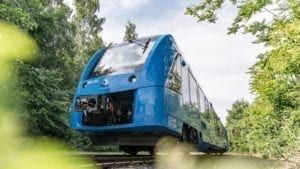Alstom S.A. (Saint-Ouen, France) has announced that after 530 days and more than 180,000 driven kilometers, the successful trial operation of the world’s first two hydrogen trains was officially completed at the end of February. Two pre-series trains of Alstom’s Coradia iLint model have been in passenger service since September 2018.

Alstom hydrogen trains have successfully complete trials (source: Alstom)
From 2022, 14 Coradia iLint series trains will replace the existing diesel multiple units. LNVG (Germany’s Lower Saxony Transport Authority) was the first company to embrace hydrogen rail innovation, investing in it with the order of 14 Coradia iLint trains and thirty years of maintenance and power supply. This project showcases the importance of green mobility for the state of Lower Saxony. As one of the leading rail vehicle manufacturers in Europe, Alstom will produce the fuel cell trains for LNVG and will be responsible for the maintenance of the vehicles at its site in Salzgitter. The gases and engineering company Linde will build and operate a hydrogen filling station for the series trains near Bremervoerde station.
“Our two pre-series trains of the Coradia iLint have proven over the past year and a half that fuel cell technology can be used successfully in daily passenger service. This makes us an important driving force on the way to emission-free and sustainable mobility in rail transport”, comments Jörg Nikutta, Managing Director for Germany and Austria of Alstom Transport Deutschland GmbH. “We have also obtained valuable data from the trial operation of the fuel cell trains for the further development of the propulsion technology.”
“We are proud that we were the first railway company in the world to be allowed to operate the first two fuel cell trains on the Weser-Elbe network. From the very beginning, our passengers were very curious about the trains and their new propulsion technology. Besides its very low noise level, the hydrogen train was able to score with its emission-free operation, especially in times of climate change. The operation of the iLint was a very special motivation for our train drivers”, said Andreas Wagner, head of the SPNV division and authorized signatory of the Eisenbahnen und Verkehrsbetriebe Elbe-Weser GmbH (evb).
Carmen Schwabl, Managing Director of LNVG, adds: “With the successfully completed trial operation, the requirements for continuous operation of the hydrogen trains from 2022 are fulfilled. LNVG thus contributes to the implementation of sustainable, innovative and ecological mobility solutions, especially in rural areas”.
“Alstom has made hydrogen history here. The project is of a great importance to industrial policy that goes far beyond Germany. Here, we are witnessing the first competitive product of hydrogen mobility at industrial level”, says Lower Saxony’s Minister of Economics and Transport, Dr. Bernd Althusmann.
“The Federal Ministry of Transport is very happy to support the beacon of modern mobility: the hydrogen train in Bremervörde. After all, this project is a flagship for the mobility of the future,” says Enak Ferlemann, Parliamentary State Secretary at the Federal Ministry of Transport and Digital Infrastructure. “Hydrogen is a real low-emission and efficient alternative to diesel. Especially on secondary lines where overhead lines are uneconomical or not yet available, these trains can travel cleanly and in an environmentally friendly way. We would like to see more such applications.”